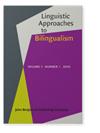传统演讲者语用学
IF 1.8
2区 文学
0 LANGUAGE & LINGUISTICS
引用次数: 0
摘要
本研究调查了作为遗产语言(HL)的俄语中的请求语生成情况,特别关注了主要社会语言(此处为 SL-希伯来语)的跨语言影响(CLI)和双语起始年龄(AOB)的作用。研究人员招募了 97 名成年参与者,分为四组:三组俄语-希伯来语双语者,他们的 SL-Hebrew 双语起始年龄各不相同:5 岁之前(32 人)、5-13 岁之间(20 人)、13 岁之后(19 人);另一组对照组为俄语单语者(26 人)。研究通过口头角色扮演,在正式和非正式语境中激发了 20 项请求。结果表明,讲传统俄语的人在各种社会语境中都能掌握原型俄语请求策略的基础知识。结果还显示了 CLI 和 AOB 对讲汉语者的语用能力的影响。在表达请求时遇到语言困难时,讲汉语的人就会使用补偿策略,从而创造出新颖的结构。这些新结构是童年时期所学俄语所特有的习惯用法和从主要 SL 语言中转移过来的习惯用法的组合。本研究通过对CLI和AOB的影响进行调查,为理解HL语用发展做出了重要贡献。本文章由计算机程序翻译,如有差异,请以英文原文为准。
Heritage speaker pragmatics
The current study investigated request production in Russian as a Heritage language (HL), with a special focus on
the role of cross-linguistic influence (CLI) of the majority societal language (here SL-Hebrew) and Age of Onset of Bilingualism
(AOB). Ninety-seven adult participants were recruited in four groups: three groups of Russian-Hebrew bilinguals with various AOBs
of SL-Hebrew – before the age of 5 (n = 32), between the ages of 5–13 (n = 20), after the age of
13 (n = 19) – and a control group of monolingual Russian speakers (n = 26). The study elicited
20 requests in formal and informal contexts through oral role-plays. The results indicate that heritage speakers acquire the
basics of prototypical Russian request strategies across various social contexts. The results also show effects of CLI and AOB in
the pragmatic competence of HL-speakers. When faced with linguistic difficulties to express requests, HL speakers resort to the
use of compensatory strategies leading to the creation of novel structures. These novel structures are a combination of
conventions that are characteristic of the Russian acquired in childhood and transfer from the dominant SL. The study makes an
important contribution to the understanding of HL pragmatic development by investigating the effects of CLI and AOB.
求助全文
通过发布文献求助,成功后即可免费获取论文全文。
去求助
来源期刊

Linguistic Approaches To Bilingualism
Social Sciences-Linguistics and Language
CiteScore
3.20
自引率
9.10%
发文量
24
期刊介绍:
LAB provides an outlet for cutting-edge, contemporary studies on bilingualism. LAB assumes a broad definition of bilingualism, including: adult L2 acquisition, simultaneous child bilingualism, child L2 acquisition, adult heritage speaker competence, L1 attrition in L2/Ln environments, and adult L3/Ln acquisition. LAB solicits high quality articles of original research assuming any cognitive science approach to understanding the mental representation of bilingual language competence and performance, including cognitive linguistics, emergentism/connectionism, generative theories, psycholinguistic and processing accounts, and covering typical and atypical populations.
 求助内容:
求助内容: 应助结果提醒方式:
应助结果提醒方式:


